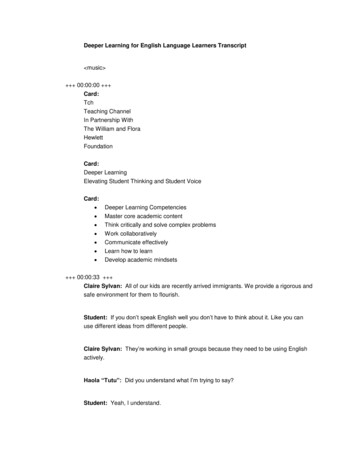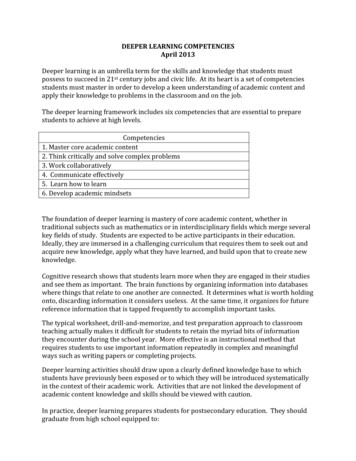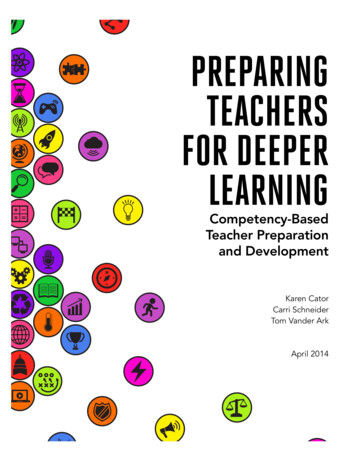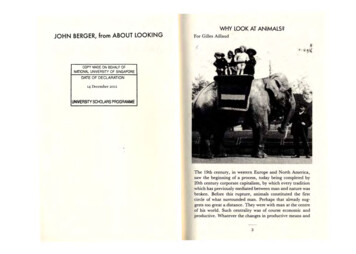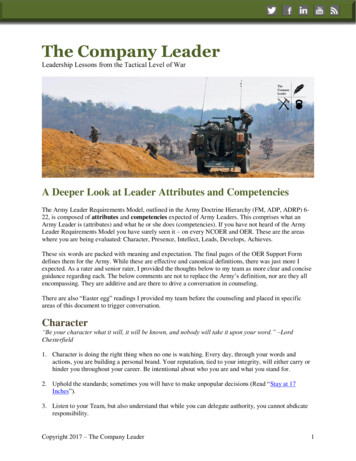
Transcription
The Company LeaderLeadership Lessons from the Tactical Level of WarA Deeper Look at Leader Attributes and CompetenciesThe Army Leader Requirements Model, outlined in the Army Doctrine Hierarchy (FM, ADP, ADRP) 622, is composed of attributes and competencies expected of Army Leaders. This comprises what anArmy Leader is (attributes) and what he or she does (competencies). If you have not heard of the ArmyLeader Requirements Model you have surely seen it – on every NCOER and OER. These are the areaswhere you are being evaluated: Character, Presence, Intellect, Leads, Develops, Achieves.These six words are packed with meaning and expectation. The final pages of the OER Support Formdefines them for the Army. While these are effective and canonical definitions, there was just more Iexpected. As a rater and senior rater, I provided the thoughts below to my team as more clear and conciseguidance regarding each. The below comments are not to replace the Army’s definition, nor are they allencompassing. They are additive and are there to drive a conversation in counseling.There are also “Easter egg” readings I provided my team before the counseling and placed in specificareas of this document to trigger conversation.Character“Be your character what it will, it will be known, and nobody will take it upon your word.” –LordChesterfield1. Character is doing the right thing when no one is watching. Every day, through your words andactions, you are building a personal brand. Your reputation, tied to your integrity, will either carry orhinder you throughout your career. Be intentional about who you are and what you stand for.2. Uphold the standards; sometimes you will have to make unpopular decisions (Read “Stay at 17Inches”).3. Listen to your Team, but also understand that while you can delegate authority, you cannot abdicateresponsibility.Copyright 2017 – The Company Leader1
4. Your character will be the foundation of who you are and what you achieve in this profession and thislife; be intentional about it.5. Humility is the most difficult and perhaps one of the most critical aspects of leadership. Never forgetwho you are, and keep it in perspective. (Read “The Bathsheba Syndrome”).Presence“Be where your feet are.” –Kevin Elko, PhD1. Be competent, organized, dependable, motivated, and display initiative. You are setting the exampleand representing leadership in your organization – and the United States Army – to everyone youencounter. This is especially true with the Soldiers you directly lead.2. Demonstrate humility; humble yourself before your Soldiers, yourpeers, and your superiors. When we lack humility, and begin tothink we are beyond fault or error, we are headed for dangerouswaters. Either humble yourself, or you will be humbled – theformer hurts a lot less. (Read “Fall of the Warrior King”)3. Fitness: You must be physically (PT, gym, athletics), mentally(family, friends, reading) and spiritually (church, meditation,recreation) fit, and you should inspire your Soldiers to be as well.Holistic fitness is a foundational aspect of our leadership, our unit,and our profession. There is a lot more to talk about here, but as abaseline – ensure you are deliberate and comprehensive in buildingyour unit fitness plan and managing your own fitness.4. Exude the Army Values. ***Someone is always watching*** (Read “Officer Expectations”).5. When briefing, rehearse, stand, and be confident. Prepare so you don’t need to act like you knowwhat you’re talking about – but rather DO know what you are talking about.Intellect“Education is the most powerful weapon which you can use to change the world.” –Nelson Mandela1. The Army makes a publication for everything you need to do; use them. Ranges and training preparesSoldiers’ proficiency and TTPs. You will plan, run, and resource training. Adhere to the 8-step modeland review ADRP 7-0. Make it hard, realistic, rewarding, practical, and safe. https://atn.army.mil/ https://strykernet.army.mil/default.aspx http://www.adtdl.army.mil/ http://www.apd.army.mil/ sp2. While it is critical to master what the Army tells you to do, we are also charged to innovate. Do not beafraid to try something new, make mistakes, learn, and find a new path.3. Don’t submit garbage products. Proofread, spellcheck, and bounce your products off of someone beforesubmitting them. ***Your products represent you***Copyright 2017 – The Company Leader2
4. With education, there is no limit to what you can achieve. Education is the great equalizer; seek outwisdom. Read, broaden, think, discuss, write, and add to the canon of the Profession of Arms.Leads“Regard your Soldiers as your children and they will follow you into the deepest valleys. Look on them asyour own beloved sons and they will stand by you even unto death.” – Sun Tzu1. Leadership is both an art and a science. No one is born a leader. You are born with affinities andattributes that are then developed. Develop yourself as a leader and never stop developing.2. Prepare and review a Leader’s Book (MAL,Roster/Admin Data, Sub HR, Tools, MFRExample, AGAR Example, OER SF,Counseling, NCOER, etc.) Leading is not allabout numbers, but leaders know the numbers.They know the data and they know their people.3. Communicate up, down, and laterally. 90% ofthe problems we face at the tactical andorganizational levels of the Army can beattributed to a failure of communicationsomewhere along the lines.4. Give to CFC or other organizations/causes (as well as AER). We cannot and will not order anyone togive to these organization. But, part of leading is giving and being generous. If you support theseorganizations and explain their importance, your unit will support them too.Develops“The one quality that can be developed by studious reflection and practice is the leadership of men.”General Dwight D. Eisenhower1. You are part of a Team, and you should instill this mindset in your organization. You’re part of theBattalion Team, Company Team, Officer/Enlisted Team, the Army Team, etc. Develop your team,and be involved in the development of the larger team.2. There is no “us versus them” mentality when dealing with elements outside of your control. Youwon’t disparage S6 when your account activation is slow. You won’t disparage the mechanics whenyour vehicles have faults. You will be a supportive member of everyone who asks of you.3. Use the pronouns we, us, and our instead of me, my, and mine. Inclusive language inspires andinclusive culture. We care about who you are as an individual, as you should about those you lead,but you are part of something bigger now. As Coach Lou Holtz used to say to players as they came tothe University of Notre Dame, “You didn’t come here for us to be like you. You came here to be likeus.” We have a culture and a standard – understand it, live it, and instill it into your part of our team.4. Cross-train and develop your Soldiers and subordinate leaders. You must prepare your subordinates tofunction two levels above their current duty position (Read “Who’s Got the Monkey”).Copyright 2017 – The Company Leader3
5. Get into your Soldiers’ business, and hold leaders accountable to know what their Soldiers are doing.Soldiers won’t always do what you EXPECT, but they will accomplish what you INSPECT. This mayseem like micromanaging, but it is the only way to get ahead of identifying high-risk Soldiers. Gettingto know your men is one of the ways you care for them.6. Your success will be determined by your subordinates’ achievements/success. If you ensure they aresuccessful, you will be as well.7. You will have additional duties that you will have never dreamt pertained to your job and dutyposition. They probably don’t, but they need to be done to make this Company and Battalionsuccessful. Do them, and do them well. We are deliberate in how we assign these and match themwith areas where we believe you may benefit from such experiential development.8. Take and review notes. Always have something on and with which to write.9. Be ready to assume more responsibility.Learn all you can in your current job,because you will only have it once. Yournext position will have different challenges,so don’t waste this opportunity.10. Build relationships within the organizationand outside of it. They will benefit you, andthis unit. Your reputation – brand – is themost important thing you have. It is acombination of your character, yourcompetence, and your attitude. The longeryou stay in the Army, the smaller it gets. Ifthings get testy, be a gentleman/lady andwalk away respectfully – you don’t have the right to burn bridges.Achieves“You can’t build a reputation on what you’re going to do.” –Henry Ford1. It is fitting the first attribute the Army lists is Character. It is the most important attribute. Character isgreater than Competence. But, notice, that doesn’t say it is greater than Incompetence. It is also fittingthat the Army saves Achieves for last; it is the bottom line.2. Technical and tactical knowledge is gained from schools, training and self-study. Self-study being themost important, but most neglected. Study the manuals, ask your peers, observe and ask questions ofother leaders in the unit. There is an abundance of information available to you as a leader; FMs,TMs, and Smart Books. You are not expected to know every question, but you need to know whenand where to look for them.3. Take initiative! Do not stop at the first sign of adversity. (Read “A Message to Garcia”)4. Cooperate and collaborate.Copyright 2017 – The Company Leader4
5. Everything you do is to ready your unit to deploy, fight, and win. Gone are the days of having a LADand knowing when/where we will deploy. We must be ready to fight – and win – our nation’s wars.This includes the readiness of equipment and people.6. Maintenance and accountability prepares our equipment. You should know your equipment andshortages better than anyone. Sub-hand receipt every piece of equipment down to the end user, andconduct inventories to hold them accountable. Accountability won’t make you the best leader, but alack thereof will hold you back. Come up on the net when something is lost – bad news does not getbetter with age. Have a dialogue with the Executive Officer and Supply Sergeant weekly about thestatus of your equipment and shortages. Maintain your Hand Receipt, shortages, sub-HRs, changedocuments within a notebook that is readily available. The American tax-payer has entrusted you withmillions of dollars-worth of equipment. Do not let them down with the loss of the slightest piece ofequipment. ***He who is faithful in little will be faithful in much***In closing, if you live out the Ranger Creed and act with character, pride, and perseverance, then you willmore than succeed.We hope this resource served you well! Feel free to share it with your teamand point them to The Company Leader for more content.Click HERE to return to the site.Copyright 2017 – The Company Leader5
Leadership Lessons from the Tactical Level of War A Deeper Look at Leader Attributes and Competencies The Army Leader Requirements Model, outlined in the Army Doctrine Hierarchy (FM, ADP, ADRP) 6-22, is composed of attributes and competencies expected of Army Leaders. This comprises what an


